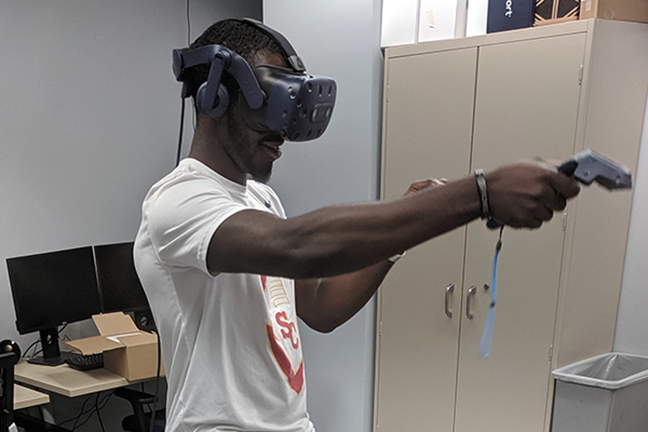Creating community in virtual environments

Social distancing is currently the most effective countermeasure against the rapid proliferation of the virus that causes COVID-19. Current reports indicate that this practice is having a significant impact. However, the most optimistic projections assume that widespread social distancing may continue for up to a year or even longer.
“We regard isolation as a serious threat to long-term compliance with social distancing, especially for healthy younger adults for whom the individual risk of mortality is low,” said Evan Suma Rosenberg, an assistant professor of computer science and engineering.
“Mitigating the negative impact of social distancing on social-emotional wellbeing is therefore paramount," he said.
“As failure to consistently maintain these practices could result in a rebound of the pandemic and further loss of human life,” Suma Rosenberg added.
To address this enormous threat to global public health, Suma Rosenberg is leading a project that leverages virtual reality to facilitate remote social interaction that is no longer safe to experience in the real world for the foreseeable future.
“In today's globalized world, technology-mediated communication is critical for society to continue functioning during the pandemic,” said Suma Rosenberg.
While the use of videoconferencing has skyrocketed, the range of activities supported by this medium are limited. Virtual reality provides the capability to interact with other people in a shared 3D environment, thereby opening the doors for a multitude of shared experiences and activities that would not be possible with other remote communication modalities.
“With a worldwide user base numbering in the tens of millions, a widespread virtual reality hardware ecosystem is already in place—making it possible to deploy new applications over the internet,” said Suma Rosenberg.
“People can also interact in online virtual environments through a web browser,” he explained. “This is important to enable broad access for those who do not have specialized equipment.”
The project is an interdisciplinary collaboration with Richard Landers, associate professor in the University of Minnesota's Department of Psychology.
Specifically, Suma Rosenberg and colleagues will:
- deploy and distribute online social virtual environments using a web-based software platform
- create onboarding procedures, tutorial videos, and public-facing documentation
- perform extensive outreach through news outlets and social media to promote their use as an alternative medium for social interaction during the pandemic
“This project will lay the foundations for a more long-term enterprise,” said Suma Rosenberg. “Over the duration of the pandemic, we plan to catalyze and facilitate a broad community effort that will develop a diverse collection of user-generated content and shared activities. We will also study the impact of web-based virtual environments on compliance with social distancing.”
This project is funded by the UMN Campus Public Health Officer's Rapid Response Research Grants program, which support University of Minnesota faculty to catalyze and energize small-scale research projects designed to address and mitigate the COVID-19 virus and its associated risks.
If you’d like to support faculty research at the University of Minnesota's Department of Computer Science & Engineering, visit the Give to CS&E website.